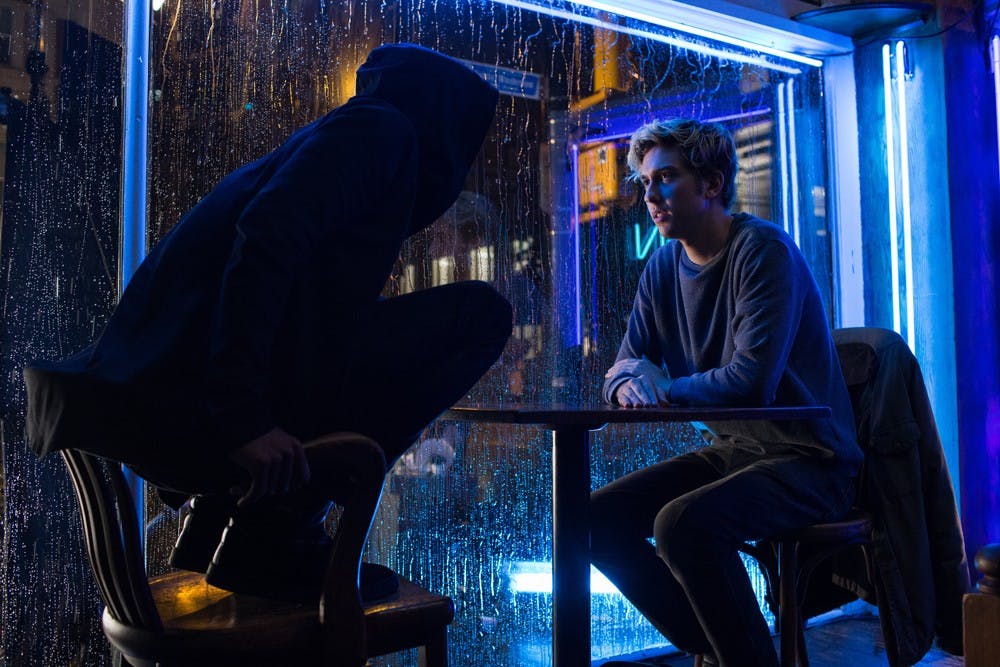Movie: “Death Note”
Director: Adam Wingard
Runtime: 1 hour 41 minutes
Release Date: August 25
Rating: D-
When Netflix announced it would release its own live-action movie adaptation of the wildly popular manga and anime series "Death Note," it seemed there might be hope for the streak of mediocre anime adaptations to come to an end. However, now that the film is here, mediocre is exactly how Netflix’s offering can be described. Between nonsensical writing, cringy dialogue, immersion-breaking acting and more, “Death Note” has turned out to be quite the mess.
“Death Note” follows Light Turner, a (supposedly) gifted yet troubled high schooler who one day happens upon a notebook that claims to grant the power to kill someone simply by writing their name inside it. After an interaction with Ryuk, a god of death who is the notebook’s rightful owner, and the discovery that the notebook’s powers are real, Light begins to use this new power to enforce his strict moral code. As he continues to use the notebook, Light begins to attract the attention of the police and eventually L, a mysterious but extremely competent investigator.
To make sure the record is clear, Netflix’s “Death Note” isn’t bad because it diverges heavily from the source material. “Death Note” is simply a bad film. While the weak acting from the two leads, Nat Wolff and Lakeith Stanfield, was by far the worst part of the film, the nonsensical plot, corny dialogue and rushed pace certainly didn’t do anything to help.
Where the anime featured one of the smartest cat-and-mouse plots I’ve ever seen, Light and L’s plots and schemes in the movie felt sloppy and nonsensical. Partially due to its rushed nature and partially due to mediocre writing, it never feels like Light and L are the master manipulators that they are supposed to be.
These pacing issues aren’t surprising, considering that director Adam Wingard was attempting to adapt a 37-episode anime into a 90 minute film. However, honestly, I don’t thinking making this a TV series would have helped too much because the characters just aren’t interesting.
Light is simply insufferable in this film. From his “you just don’t understand me, Dad!” tantrums to his cartoonish smiles and everything in between, it was next to impossible to feel sympathy, intrigue or really anything other than annoyance towards Wolff’s portrayal of Light. Stanfield’s L isn’t much better. Director Wingard’s attempts to show the dichotomy between L’s quirky and childlike personality and his impressive detective skills fell completely flat and skirted dangerously close to the line of parody.
In a story where I was supposed to be viewing these two characters as the two masterminds on opposite sides of the largest case of mass murder the world has ever seen, I shouldn’t have been rolling my eyes half as many times as I did.
Side characters didn’t do much to help out either. Even with big names like Willem Dafoe as Ryuk and Shea Whigham as Light’s father, “Death Note” never stopped feeling like a small, B-movie. Dafoe’s voice acting for Ryuk and the CGI that brought the freakish monster to life were both adequately spooky, but that’s about the most you can say. The writing and plot points that both Dafoe and Whigham were involved in were lazy, convenient and ultimately uninteresting. Even Mia, Light’s partner in crime, who is by far the most interesting character in the film (and the only one that might have surpassed their anime counterpart) suffered from questionable motives, unearned character progression and corny dialogue.
It’s not completely clear if Netflix’s “Death Note” was aiming to please fans of the original manga and anime, draw in new viewers or both, but whatever the case, it missed the mark. While this could have been a great opportunity to piggyback off both the Netflix and “Death Note” names, the writing, pacing and acting problems will likely make this film go down as yet another disappointing anime adaptation. Out of your two “Death Note” viewing options available on Netflix, the 2007 anime is still clearly your best bet.

